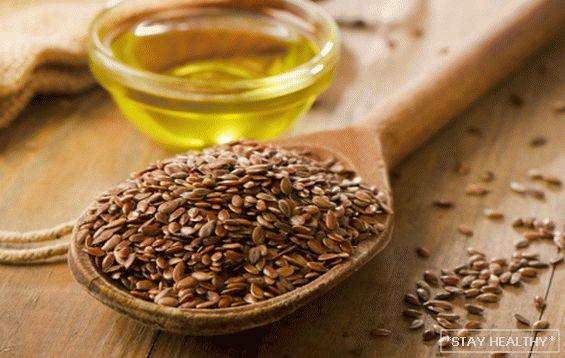 Ср, 03 авг 2016 Автор: Алёна Попович
Ср, 03 авг 2016 Автор: Алёна Попович
Today, like many centuries ago, flax is used as an effective
remedy for many ailments.
Broths, infusions, meal, oil or whole flax seeds are
healthful dietary supplement rich in vitamins and other
necessary body substances.
The unique combination of these substances makes flax seed natural.
medication.
Contents
Flaxseed: calories, beneficial properties
Caloric value of 100 grams of seeds makes 534 kcal.
The main components that determine useful properties
flaxseed are:
• mucus and water soluble fiber;
• lignans;
• high concentration of B vitamins;
• Omega-acids.
The mucus that forms from flax seeds is excellent.
means to protect the digestive system from harmful effects.
It envelops the inner walls of the stomach and intestines, which
protects them from damage. Under the influence of flax slime,
wounds and ulcers heal, inflammation of the gastrointestinal tract. Also mucus
acts as a powerful barrier to the entry of harmful substances into the blood,
that enter the body with food (eg, cholesterol).
Лигнаны — это фенольные соединения или
plant hormones. Their main function is to clean the vessels.
and blood. Such exposure to the component prevents
sclerotic plaques, the accumulation of which leads to diseases
heart and stroke. Scientists have proven that system consumption
flax seed can prevent the occurrence of cancer
diseases of the digestive system, breast and prostate.
The B vitamins present in the seeds are actively involved in
carbohydrate metabolism. With their help, sugar is fully absorbed.
Also, these vitamins have a positive effect on the nervous system,
normalize sleep and strengthen memory.
The percentage of fatty acids Omega 3, Omega 6 and Omega 9
so high that it exceeds their content in meat, fish and soy.
These acids are antioxidants. They do not allow unnecessarily
blood clots, prevent inflammation of the musculoskeletal
apparatus, prevent the accumulation of harmful cholesterol,
provide the elasticity of blood vessels, regulate metabolism and
hormonal processes.
Flaxseed: useful properties for various diseases
Today, flaxseeds are most often used as helpers.
in the fight against obesity. Due to their enveloping properties, they
dull your appetite. A huge complex of vitamins in the composition of the seed
replenishes the body during diets and prophylactic conditional
fasting
Alpha-linolenic acid is one of the Omega acids, which
prevents vascular inflammation and normalizes heart rhythm.
Therefore, flax is very effective in treating heart disease.
and vessels:
• myocardial infarction
• coronary heart disease;
• hypertonic disease.
The components of the grain are able to stop the sclerotic processes that
prevents the occurrence of blood clots, and therefore atherosclerosis, and
stroke
In diseases of the digestive tract flax slime,
containing all the useful components of a seed, it’s not only appearing
anti-inflammatory and analgesic. For example, when
gastritis and gastric ulcer, it envelops the walls and ulcers, protecting them
from the aggressive action of gastric acid. For constipation mucus
Flaxseed is a mildly effective remedy.
Since the flaxseed composition is ideal for normalizing the exchange
substances, seeds are used to treat many endocrine
diseases. With type 2 diabetes, flax seeds prevent
the occurrence of diabetic neuropathy, stabilize exchangeable
processes and reduce weight.
Flaxseed oil effectively fights against such skin
diseases like psoriasis and eczema. Fatty acids help the skin
recover and greatly facilitate the patient’s condition. Also
flaxseed oil treats acne. The components of the oil dissolve
upper oily skin film and allow it to breathe and pull lines
fat from then.
Anti-inflammatory properties of flaxseeds allow
use them as an adjunct in the treatment
rheumatoid arthritis and other diseases of the joints inflammatory
character
Infusion of flaxseed is effective in infectious diseases
upper respiratory tract. With it is thinned and displayed
excess mucus from infection.
Flaxseed: beneficial properties for children, nursing moms
During breastfeeding with milk
gives the child a huge amount of vitamins, minerals and other
beneficial substances. In order to make up for these
components do not always lack simple food. Additional
The source can be flaxseed, containing the necessary
mother and child vitamins, minerals, polyunsaturated acids and
fiber.
Due to the content of vitamins E and A in flaxseed, its oil
copes well with inflammations on the skin of both mother and
baby It fights well with the irritation on the skin of the baby, and mom
helps to restore skin elasticity after childbirth. Linen compress
mucus is used in case of milk stagnation. This allows you to relieve inflammation and
discomfort.
One of the important aspects of the health of the child and mother is
strengthening the immune system. Fatty acids contribute to this.
which are not produced in the body, but in large quantities
are present in flaxseed. Its constant consumption in food
will allow in the future to avoid the pain of the child and increase
resistance of the body to colds and inflammatory diseases.
Thanks to phytohormones (lignans), which are contained in the seed,
a woman recovers faster after childbirth. For a child, it’s
non-replaceable component for the formation of new vessels during
growth.
Having a large amount of flax fiber helps with
constipation, which are observed in many women after childbirth. For
baby’s intestines flax is useful as a means of promoting growth
beneficial microflora and increased physical activity of the digestive tract.
Potassium, magnesium and manganese in flaxseeds allow for correct
to form and grow to a child’s body, and to a nursing woman
keep these minerals at the proper level for the health of nails, hair and
skin.
Flaxseed: contraindications
The main contraindication to the use of flaxseed is
their excessive use. Normal daily dose is considered
20-25 grams of seeds.
Contraindications for taking all flaxseed products
seed:
• pancreatitis in the period of exacerbation;
• acute cholecystitis;
• cholelithiasis;
• stones in the bladder and kidneys;
• intestinal obstruction;
• uterine fibroma;
• endometritis.
Do not recommend flaxseed to take women after cesarean
section, as well as 2 weeks after vaginal delivery, as it can
bleeding occurs.
Allergic people should start with 1/4 tea
spoons of flax seeds. Contraindication to the reception is the occurrence
allergic reaction.
To avoid meteorism, initial doses should not be
exceed 1 teaspoon of seeds.
Do not take flaxseed with antidepressants,
coagulants and hormonal drugs.






